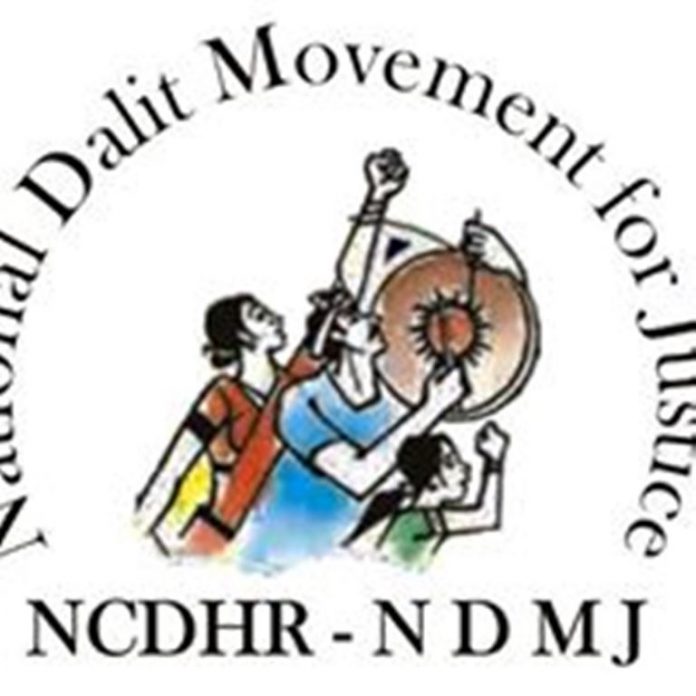TCN News
National Dalit Movement for Justice (NDMJ), headquartered in New Delhi, has released a detailed report on increasing human rights violation cases against Dalits, Adivasis and other marginalized communities of India during COVID-19 lockdown.
In April and May alone during the nationwide lockdown, NDMJ and SASY intervened in 67 cases of caste and gender-based violence, the nature of these cases revealing layered untouchability through socio-economic boycott and physical assault as the main cause. Reports of the murder of Dalit men, brutal physical attacks on Dalit families, rape and murder of minors, domestic violence have flooded media sections covering the community. Also, cases of Dalit women being branded witches and their heads tonsured, forced to consume human waste, honour killings and death of sanitation workers were recorded by the Dalit monitoring agency.
The more shocking news of negligence in treating Corona positive patients surfaced from Tamil Nadu, with 39 cases of caste atrocities in the state during the lockdown in which SASY intervened legally. Cases of serious physical assaults and Ambedkar statue desecration came from Bihar, Uttar Pradesh and Haryana’s semi and rural areas, with majority victims among agricultural labourers. In these instances were also examples where Dalits were denied to harvest crops due to the fear of spreading Coronavirus and were assaulted by landowners and influential farmers.
NDMJ has urged the respective state governments to register FIRs under the SC/ST PoA Act and violation of curfew rules (144 curfew) so that the culprits can be arrested under the Goondas Act in cases for the atrocities.
According to NDMJ-SASY’s report, “this pandemic has also exposed the broken system of untouchability and casteist attitude at work,” other than disclosing health sector failures of the government. NDMJ-NCDHR has been monitoring the impact of COVID-19 since the start of nationwide lockdown, revealing massive government failures in health and relief access to the minorities and marginalized sections of the country owing to the usage of the term ‘social distancing.’ The report proves with cases and all over India that ‘social distancing’ as a measure to curb the spread of the disease has led to a surge in physical assaults and social boycott of the already marginalized community. In this regard, the report highlights that the term “actually bred into the caste practice of untouchability in many nuanced ways during this pandemic,” leading to multilevel atrocities against them. The experiences of marginalized communities have to do a lot with the practice of social distancing similar to untouchability since generations, therefore NDMJ-NCDHR has instead preferred “physical distancing” as more appropriate terminology, which is also endorsed by WHO guideline.
Identified as “the most vulnerable community members,” the network has been intervening in various relief work campaigns through close engagement with district and state-level authorities so that the community has better access to healthcare, rations and kits.
To better address these cases during the lockdown, the NDMJ has recommended District Collectors to conduct meetings once in a month with State Vigilance Monitoring Committee (SVMC) to review the existing situation with Dalit and Adivasi Rights Social activists. The report of the same can be generated to the Chief Minister with whose recommendations, better procedures could be implemented.
The report has further revealed that “COVID 19-situation and the consequent lockdown has resulted in many deaths, murders and suicides due to mismanagement.” This is most reflected in the looming migrant crisis wherewith “the sheer desperation of the economically and socially marginalized communities to reach home was not well planned,” resulting in “deaths due to starvation and exhaustion.” While a 12-year-old working in a chilly farm at Kannaikoda village of Telangana was confirmed death due to exhaustion and starvation due to walking for 3 days at a stretch covering a distance of 150 km, the suicide of six on the railway tracks and death of 80 persons on Shramik trains and stations were reported according to railway officials.
“Despite being at the frontlines, sanitation workers are still at the bottom of priorities,” informs the report. Continuing with exhaustive details of deaths and negligence, it has outlined the plight of sanitation workers, who being a significant part of frontline workers have suffered due to inadequate availability of healthcare essentials. Lack of protective gear during the pandemic made the situation worse, heightening their susceptibility to the virus. According to estimates, 40-60% of the six million households of Dalit sub-castes are engaged in sanitation work and their vulnerability is worst hit amid the pandemic. NDMJ states that “sanitation workers at this point of time are only provided with some pairs of gloves,” thus exposing the government’s lack of prioritizing minorities.
The report concludes on the note that “all such incidents indicate a major humanitarian crisis and mismanagement by the concerned officials.” In a larger picture, data and stats of increasing incidences of violence against Dalits speak of their “inhuman treatment”, calling for policymakers to address this urgently.
NDMJ-SASY have made important recommendations regarding the instances of human rights violation including probing cases of domestic violence, mechanization of sanitized work and increment of budgetary allocation to prioritize the public health sector. Especially in view of Dalits, Adivasis and other marginalized sections, the report has demanded that “survivors of caste atrocities should be provided relief and rehabilitation under the Contingency Plan of the SC/ST PoA Act” as well under the Scheduled Caste Sub Plan and Tribal Sub Plan to provide them with new employment opportunities.
The groups reiterated there is an urgent need for state governments “to constitute a special monitoring committee at district and taluk levels to reduce and prevent incidences of caste-based discriminations and violence.”


